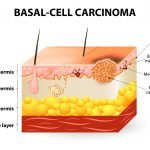Mindfulness & CA
Athanasios Psihogios, BA
Monique Aucoin, BMSc, ND
While many resources and treatments for managing malignancy are available for cancer patients, both the disease itself and concomitant therapies can compromise quality of life (QOL). Due to the complexity of oncological care, effective non-pharmacological therapies which improve a patient’s QOL, and without interfering with ongoing treatment, are sought after.
Mindfulness & QOL
Mindfulness, as defined by the Mental Health Foundation, is a method of paying attention, where one brings conscious awareness to experiences in the present moment without judgement.1 In addition to its use in psychiatric populations, mindfulness-based interventions (MBI) have become common among cancer patients and care providers, as evidenced by a growing body of clinical trials and systematic reviews. Common forms of MBI include mindfulness-based stress reduction (MBSR) and mindfulness-based cancer recovery (MBCR), which is specifically tailored for cancer patients.2 Both involve weekly group sessions with a facilitator and daily home practices, eg, meditation, to increase non-judgmental awareness.
QOL, as defined by the National Cancer Institute, is the overall enjoyment of life, including an individual’s sense of well-being and ability to carry out various activities.3 In this review, studies will be considered which investigate the effects of MBI on QOL in cancer patients, including sleep, anxiety, depression, overall mental health, and self-reported well-being.
MBI & QOL in Cancer
Two 2012 meta-analyses form the foundation of evidence that MBIs have a clinically significant impact on cancer patients’ QOL. The meta-analysis by Zainal et al, which pooled 9 studies (n=470), showed that MBSR significantly reduced stress, anxiety, and depression in breast cancer patients.1 They concluded that MBIs have the potential to significantly improve the mental health of breast cancer patients and can be recommended as part of their rehabilitation.1 The second meta-analysis, by Cramer et al, which included 3 RCTs (n=327), showed that when compared to usual care, MBSR was superior in its ability to reduce both depression and anxiety; the authors later concluded that MBIs show promise and warrant further research.4
A number of high-quality studies have since become available for interpretation. These new studies, which implemented more rigorous designs, will be examined to further understand the effects of MBI on QOL in cancer patients…
Depression: A large RCT of 229 women with breast cancer, which implemented an 8-week MBSR program and compared it to standard care, revealed significant improvements in depression.5 Symptoms of depression significantly improved at the 8-week mark, while anger only improved after 12 weeks, indicating a relatively quick effect for depressive symptoms compared to others.
Pooled results of a meta-analysis by Huang et al, including 6 studies and 536 cancer patients, showed a significant positive effect of MSBR on depressive symptoms compared to controls.6 Post-examination of the studies included in the review found that regular supervision with a mindfulness teacher and yearly attendance at retreats/conferences maximize the benefits of MBSR for QOL aspects such as depression. The use of MBSR CDs or DVDs, offering visual and auditory instruction, can improve adherence to a mindfulness protocol when illness prevents patients from being able to actively participate in seminars.6
Anxiety & Stress: A study published in Psycho-Oncology found that a 7-week MBSR intervention significantly improved anxiety symptoms for at least 6 months after completing the course.7 There was a noted delay in statistically significant improvement: although patients showed no benefit when assessed immediately after the MBSR course, significant improvement was achieved at the 1-month post-intervention assessment. Findings suggest that the absence of immediate results should not infer ineffectiveness, but rather that the benefit may be slow to establish.7
A comparative RCT of MBSR found that a mindfulness intervention resulted in greater reduction of stress and overall social support post-training when compared to supportive-expressive group therapy (SET).8 Authors Carlson et al also measured cortisol throughout the study as a biomarker for stress reduction, and found that MBSR was able to buffer unfavorable changes that would otherwise occur without psychosocial intervention. This study of 271 distressed cancer survivors found MBSR to benefit QOL in areas such as stress level, overall wellness, and social support, while also resulting in more normative diurnal cortisol profiles. These QOL benefits were seen across a range of breast cancer survivors, from early-stage through stage III cancers.8
Sleep Quality & Cognition: Along with studies investigating the effects of MBSR interventions for depression and anxiety, there has been a focus on sleep quality of cancer patients, which, when disturbed, can hinder QOL. Cancer survivors, randomized to an MBSR group that received a formal 6-week in-class program, experienced higher objective sleep-parameter scores, a higher percentage of total sleep time, and fewer waking instances.9 Unlike other studies assessing sleep, this trial presented results not only with subjective sleep scores, but also objective ones.
In another study, 8 weeks of MBSR training was shown through cognitive testing to help breast and colorectal cancer survivors with fatigue improve their attention and accuracy.10 Fatigue symptoms experienced by cancer patients are often accompanied by cognitive impairment, leading to a lower QOL. This study establishes MBSR as a promising treatment for cognitive impairment, not only due to its effectiveness, but also for its lasting effects, as the improvements were found to last to the 6-month assessment point.10
Discussion
This review presents evidence that MBI can positively influence QOL by managing psychological and cognitive cancer-related symptoms such as depression, anxiety, stress, and cognitive impairment. Studies assessed in this review consistently demonstrate that MBI can promote a better QOL status for cancer patients and survivors, plausibly making mindfulness-based therapies a useful part of cancer care in the future.
Based on the findings, MBI should be conducted for at least 7 weeks in order to achieve a therapeutic effect, include regular patient-practitioner meetings or seminars, and provide patients with resources, such as CDs or handouts, to increase compliance. It should be noted that symptom improvement can be delayed in some patients, and so the absence of immediate QOL improvement should not be interpreted as an unsuccessful intervention. MBI appear to be beneficial for both active cancer patients and survivors.
While this review substantiates the role of MBI in cancer patient QOL management, there were some limitations to the studies reviewed. Most of these studies examined the impact of MBI on breast cancer patients, thus conclusions cannot be definitively drawn for other forms of cancer with unique pathological features. Limitations of study design in some of the studies included the absence of control groups and blinding to allocation. However, some studies used very rigorous methodology. One study compared an MBI to a group support program with the same length of class time, as well as a 1-day stress-management control group.8 The benefits observed in the MBI group were greater than those in the support group, and both of these interventions were more beneficial than the control group. This difference in effect suggests that the benefits obtained by patients receiving MBIs are not related to non-specific factors such as group/social interaction, attention from a clinician, or an expectation effect, but rather are related to the material covered in the mindfulness intervention. Additional large and rigorously-designed studies using active control groups will help establish a stronger causal link between MBI and QOL benefit for cancer patients and survivors for an array of cancer subtypes.
No studies reported adverse events or interactions with other interventions related to participation in the MBIs; however, dropouts were often poorly reported.4
Because MBIs are delivered in a group setting, there is evidence of cost-effectiveness.7 Additionally, many of the studies documented further improvement after the completion of the program, as well as maintenance of clinical improvement at long-term follow-up assessments, without further participation in the intervention.
While not precisely known, it has been suggested that MBIs exert their effect on depression, anxiety, stress, and sleep by reducing both rumination about past events and worry about the future. In cancer patients, this may include concerns about treatments, prognosis, or other uncontrollable elements of the disease. Mindfulness emphasizes the development of a different response to challenges: rather than trying to change a difficult situation (not possible in many cases), participants learn to relate to the situation in a different way.8
MBI appear to be an effective, safe, cost-effective, and feasible therapeutic option for better managing cancer patient and survivor symptoms related to poor QOL. Based on ongoing research, practitioners should feel confident that MBI can help improve the QOL of their cancer patients and help manage associated symptoms.
 Athanasios Psihogios, BA, is a 1st-year naturopathic medical student attending the Canadian College of Naturopathic Medicine (Class of 2019). He graduated from the University of Ottawa in 2015, and was accepted into the naturopathy program after 3 years of undergraduate studies. Personal topics of interest include naturopathic and integrative oncology, symptom management, cancer prevention, and furthering the body of evidence for naturopathic medicine, as a whole. Athanasios is also founder of @IntegraOncoRes, a Twitter-run webpage dedicated to sharing recent integrative oncology studies and promoting holistic cancer care.
Athanasios Psihogios, BA, is a 1st-year naturopathic medical student attending the Canadian College of Naturopathic Medicine (Class of 2019). He graduated from the University of Ottawa in 2015, and was accepted into the naturopathy program after 3 years of undergraduate studies. Personal topics of interest include naturopathic and integrative oncology, symptom management, cancer prevention, and furthering the body of evidence for naturopathic medicine, as a whole. Athanasios is also founder of @IntegraOncoRes, a Twitter-run webpage dedicated to sharing recent integrative oncology studies and promoting holistic cancer care.
 Monique Aucoin, BMSc, ND, is a licensed naturopathic doctor in Toronto, Canada, with a clinical focus on the treatment of mental health concerns and stress management. She is also a research fellow at the Canadian College of Naturopathic Medicine, where she studies the safety and efficacy of natural therapies. Dr Aucoin has presented research at conferences across North America and to hospital teams in the city of Toronto, sharing current research about the use of complementary and alternative medicine.
Monique Aucoin, BMSc, ND, is a licensed naturopathic doctor in Toronto, Canada, with a clinical focus on the treatment of mental health concerns and stress management. She is also a research fellow at the Canadian College of Naturopathic Medicine, where she studies the safety and efficacy of natural therapies. Dr Aucoin has presented research at conferences across North America and to hospital teams in the city of Toronto, sharing current research about the use of complementary and alternative medicine.
References
- Zainal NZ, Booth S, Huppert FA. The efficacy of mindfulness-based stress reduction on mental health of breast cancer patients: a meta-analysis. Psychooncology. 2012;22(7):1457-1465.
- Carlson LE. Mindfulness-based cancer recovery: The development of an evidence-based psychosocial oncology intervention. Oncology Exchange. 2013;12(2):21-25.
- National Cancer Institute. NCI Dictionary of Cancer Terms. Quality of Life. NCI Web site. http://www.cancer.gov/publications/dictionaries/cancer-terms?cdrid=45417. Accessed January 15th, 2016.
- Cramer H, Lauche R, Paul A, Dobos G. Mindfulness-based stress reduction for breast cancer- a systematic review and meta-analysis. Current Oncology. 2012;19(5):e343-e352.
- Hoffman CJ, Ersser SJ, Hopkinsons JB, et al. Effectiveness of mindfulness-based stress reduction in mood, breast- and endocrine-related quality of life, and well-being in stage 0 to III breast cancer: a randomized, controlled trial. J Clin Oncol. 2012;30(12):1335-1342.
- Huang HP, He M, Wang HY, Zhou M. A meta-analysis of the benefits of mindfulness-based stress reduction (MBSR) on psychological function among breast cancer (BC) survivors. Breast Cancer. 2015 Mar 29. [Epub ahead of print]
- Johns SA, Brown LF, Beck-Coon K, et al. Randomized controlled pilot study of mindfulness-based stress reduction for persistently fatigue cancer survivors. Psychooncology. 2015;24(8):885-893.
- Carlson LE, Doll R, Stephen J, et al. Randomized controlled trial of Mindfulness-based cancer recovery versus supportive expressive group therapy for distressed survivors of breast cancer. J Clin Oncol. 2013;31(25):3119-3127.
- Lengacher CA, Reich RR, Paterson CL, et al. The effects of mindfulness-based stress reduction on objective and subjective sleep parameters in women with breast cancer: a randomized controlled trial. Psychooncology. 2015;24(4):424-432.
- Johns SA, Von Ah DV, Brown LF, et al. Randomized controlled pilot trial of mindfulness-based stress reduction for breast and colorectal cancer survivors: effects on cancer-related cognitive impairment. J Cancer Surviv. 2015 Nov 19. [Epub ahead of print]









